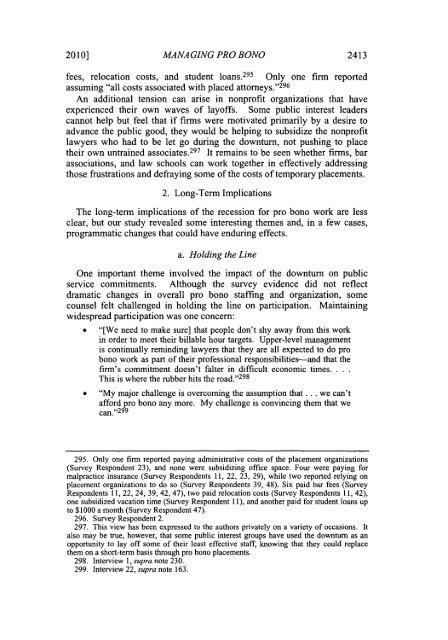Law for The Poor
Law for The Poor
Law for The Poor
You also want an ePaper? Increase the reach of your titles
YUMPU automatically turns print PDFs into web optimized ePapers that Google loves.
2010] MANAGING PRO BONO<br />
2413<br />
fees, relocation costs, and student loans. 295 Only one firm reported<br />
assuming "all costs associated with placed attorneys." 296<br />
An additional tension can arise in nonprofit organizations that have<br />
experienced their own waves of layoffs. Some public interest leaders<br />
cannot help but feel that if firms were motivated primarily by a desire to<br />
advance the public good, they would be helping to subsidize the nonprofit<br />
lawyers who had to be let go during the downturn, not pushing to place<br />
their own untrained associates. 297 It remains to be seen whether firms, bar<br />
associations, and law schools can work together in effectively addressing<br />
those frustrations and defraying some of the costs of temporary placements.<br />
2. Long-Term Implications<br />
<strong>The</strong> long-term implications of the recession <strong>for</strong> pro bono work are less<br />
clear, but our study revealed some interesting themes and, in a few cases,<br />
programmatic changes that could have enduring effects.<br />
a. Holding the Line<br />
One important theme involved the impact of the downturn on public<br />
service commitments. Although the survey evidence did not reflect<br />
dramatic changes in overall pro bono staffing and organization, some<br />
counsel felt challenged in holding the line on participation. Maintaining<br />
widespread participation was one concern:<br />
* "[We need to make sure] that people don't shy away from this work<br />
in order to meet their billable hour targets. Upper-level management<br />
is continually reminding lawyers that they are all expected to do pro<br />
bono work as part of their professional responsibilities-and that the<br />
firm's commitment doesn't falter in difficult economic times ...<br />
This is where the rubber hits the road." '29 8<br />
* "My major challenge is overcoming the assumption that.., we can't<br />
af<strong>for</strong>d pro bono any more. My challenge is convincing them that we<br />
can." 299<br />
295. Only one firm reported paying administrative costs of the placement organizations<br />
(Survey Respondent 23), and none were subsidizing office space. Four were paying <strong>for</strong><br />
malpractice insurance (Survey Respondents 11, 22, 23, 29), while two reported relying on<br />
placement organizations to do so (Survey Respondents 39, 48). Six paid bar fees (Survey<br />
Respondents 11, 22, 24, 39, 42, 47), two paid relocation costs (Survey Respondents 11, 42),<br />
one subsidized vacation time (Survey Respondent 11), and another paid <strong>for</strong> student loans up<br />
to $1000 a month (Survey Respondent 47).<br />
296. Survey Respondent 2.<br />
297. This view has been expressed to the authors privately on a variety of occasions. It<br />
also may be true, however, that some public interest groups have used the downturn as an<br />
opportunity to lay off some of their least effective staff, knowing that they could replace<br />
them on a short-term basis through pro bono placements.<br />
298. Interview 1, supra note 230.<br />
299. Interview 22, supra note 163.

















